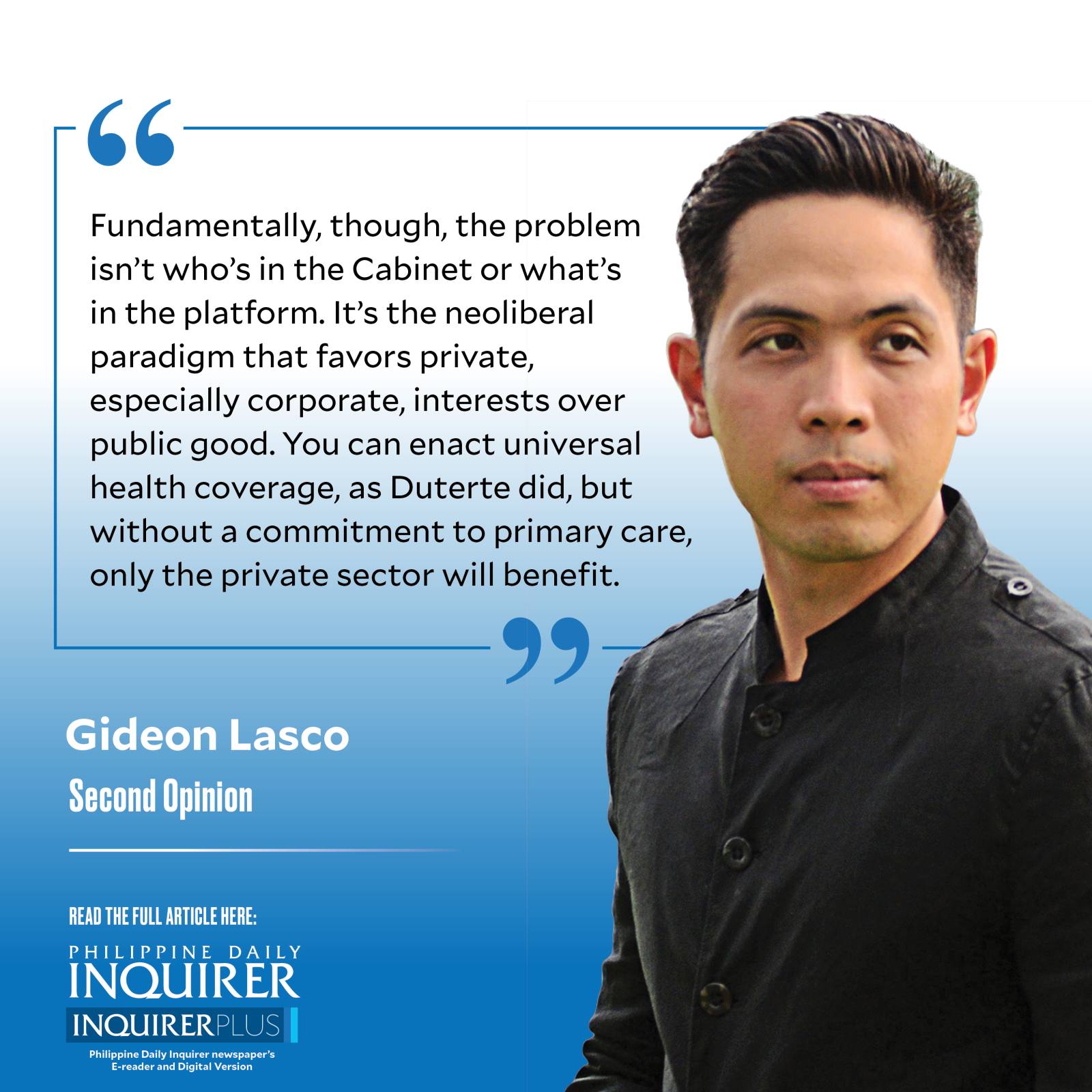
Gon and Killua, two young, fictitious friends, are in the middle of a conversation while jogging at the Academic Oval:
Killua: Happy New Year, Gon! Are you part of the 92 percent who are feeling hopeful for 2024?
Gon: Happy New Year, Killua! Yes and maybe not. I’ve always been hopeful as a person. But in terms of our political future, it’s hard to be, especially with talk of 10, maybe 16 years, of the same names in power.
Killua: Don’t be so sure. In 2016, everybody thought Jejomar Binay was the man to beat. In 2010, nobody thought that Cory Aquino’s death would catapult Benigno “P-Noy” Aquino III. Keep an eye on Raffy Tulfo, some observers say, but I’m with Master Yoda: “Hard to see, the future is.” Your pessimism is warranted, though, especially with many still wondering about the what-could-have-beens of 2022, instead of asking what can we do today.
Gon: What could have been, Killua, if you voted for Leni Robredo?
Killua: I’m not gonna lie, I voted for Ka Leody de Guzman. I know, you’ll say “Oh, you wasted your vote.” But aren’t we held back by that kind of thinking? There must be a term for how self-fulfilling and problematic it is to not vote for someone because they’re not “winnable.” Why couldn’t we aspire to change the system? Sure, a Leni victory would’ve been a better outcome, but would things have been very different? Would she have taken a different approach in the West Philippine Sea; toward the United States, China, or Palestine? Would she have sided with the jeepney drivers, or with the Dumagats versus Kaliwa Dam?
Gon: For one, we wouldn’t have Sara Duterte in the Department of Education. Maharlika Investment Fund, intelligence funds. Leni respected expertise and valued transparency; as Philippine chief executives go, she would’ve been a good president, unbeholden to dynastic or economic interests. She would’ve gone after Rodrigo Duterte for the sake of justice, not politics. Moreover, she had a winning shot, and, let’s face it, politics is about winning elections. We needed a broad coalition behind the most viable candidate.
Killua: Many of us actually joined the coalition, but can you explain the unfortunate exclusion of Neri Colmenares?
Gon: I agree that there has to be a soul searching—with the rigor of a Raquel Fortun—over what went wrong, beyond the cheating and disinformation. We should’ve concerned ourselves not just with the campaign’s rightness but its resonance; people were more interested in the future than the past. Much as I’d like to imagine that Leni won, we have to ask why Bongbong Marcos and Sara had vast support. Still, you have to give Leni credit for what she accomplished. Without the machinery, several years’ planning, or Swiss bank accounts, she actually managed to cobble a coalition, from the Moro Islamic Liberation Front and the Moro National Liberation Front to Makabayan and 1Sambayan. The Sumilao farmers marched for her. If you look beyond the pink wave she inspired, her actual platform was quite comprehensive.
Killua: Fundamentally, though, the problem isn’t who’s in the Cabinet or what’s in the platform. It’s the neoliberal paradigm that favors private, especially corporate, interests over public good. You can enact universal health coverage, as Duterte did, but without a commitment to primary care, only the private sector will benefit. But we can’t afford incremental reforms, because before we know it, the Villars of the world would have gobbled more of our land. Don’t get me wrong: I wish Leni luck and hope she runs for the Senate, alongside Leila de Lima who I’m glad is finally free. But beyond elections, we should be thinking of civic engagement at the barangay level; of supporting local candidates and initiatives. Of focusing on what we can do during/with/despite the present administration, from addressing the education crisis to advocating for better drug policies. And fighting, as Chad Booc did, for land and labor rights. When it comes to nation-building, we need both strategy and tactics.
Gon: Leni would’ve fought for similar things; at least she would’ve enabled a freer, more vibrant civil society. Where different opinions are listened to, not Red-tagged, locked up, shut down, or worse. Speaking of which, how can we create spaces where people can freely discuss and debate ideas without being canceled? This, to me, is an important first, or zeroth, step. And we’ll need to address the indifference; many people today care more about Ricci Rivero’s love life than our politicians’ dirty laundry. Unlike in Hong Kong or Thailand, I suspect that the reason why many of us aren’t too invested in our politics is because we think we can live our lives elsewhere. When Filipinos can no longer tolerate what’s going on in their country, they don’t say, “It’s time to fight.” They say, “It’s time to leave.”
Killua: And yet, when we actually had those moments, people did stay. And people did fight. At least, enough people did. If there’s any inspiration I’d take from last year, it’s from the Sibuyanons who managed to block mining on their island. Like you, Gon, I’m still grappling with the messiness, the complexity, of our politics, of our country, and have much to learn from others. But I know this much is true: We cannot underestimate the revolutionary potential of a nation that has outlasted colonial regimes, brutal wars, not to mention countless corrupt presidencies.
—————-
glasco@inquirer.com.ph

